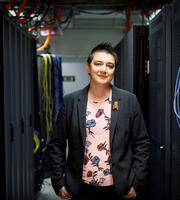Your mother’s eyes, your father’s nose…we all know that genetics play a big part in what we look like and who we are.
But it’s also genes that can influence the diseases and conditions we might experience in our lives, including multiple sclerosis (MS). This is why it’s vital that medical researchers tackle these tough problems.
Dr Jac Charlesworth is a computational geneticist who is working on gene discovery for neurodegenerative diseases. She leads a computational and neurogenomics research group at the University of Tasmania’s Menzies Institute for Medical Research and she studies genetic differences between people, and how genes can influence disease risk or alter biology.
Her primary focus is on using genetic information from large families for ‘gene hunting’; a powerful approach that is also computationally intensive.
Dr Charlesworth also runs the Menzies Computational Genomics Computing facility, which allows Tasmanian genetic researchers to store and analyse Tasmanian genomic data securely and locally.
My primary research interest is to understand the genetic control of neurodegeneration, and to find better drug targets for neuroprotection and repair.
“One of the strengths of working at Menzies and with the Tasmanian population is the incredible willingness of people to participate in our studies – from the patients right through to their clinical specialists – which is vital for studies like our MS family sequencing study.”
The Menzies MS family sequencing study
MS is the most common, disabling nervous system disease in young adults. In MS, the immune system attacks the brain and spinal cord, and current treatments all rely on switching off some part of the immune system. Dr Charlesworth’s research projects are aimed at better understanding the neurodegenerative component of MS, to develop treatments aimed at neuroprotection and repair, rather than immune suppression.
“Genetics plays an important role in MS risk. ‘Case-control’ studies have helped us identify some of the population-level genetics risk factors for MS but can’t provide the kind of genetic information that leads to new treatments,” she said.
Dr Charlesworth said families with multiple cases of MS are uncommon, but they do exist.
“Those families allow us to use ‘precision’ or personalised medicine approaches to pinpoint specific genetic differences that might lead to MS development.
This project studies the genomes of families with MS to determine why some people are more susceptible to nerve damage following the immune attack.
“In this study we work with families who have several people with MS and sequence the genomes of everyone (with or without MS) to determine if there are genetic differences that explain why some people develop MS,” Dr Charlesworth said.
“This work will find new MS risk genes and lead to treatments aimed at protecting or repairing the nervous system.”
The genetics of brain lesions study
MRI scans of the brain show that most people have some small degree of demyelination (damage to the protective covering of the nerves in our brain and spinal cord) and an ongoing ability to repair this damage, and that these processes are partly controlled by genetics.
Understanding more about the biology and genetics of ‘normal’ variation in brain lesion formation and repair will also help us understand how these pathways might be disrupted in diseases such as MS.
This study is run in collaboration with Yale University and the University of Texas Rio Grande Valley and uses brain imaging and genomic data from hundreds of people in large families without any major neurological disease.
“We are using these data to find genes involved in the normal biological processes of lesion formation and repair, so that we have a better idea of which genes to investigate in diseases where these processes go awry, such as MS,” Dr Charlesworth said.
To support this vital research, please visit:
- menzies-giving.utas.edu.au/donate (Australia)
- foundationusa.utas.edu.au/donate (USA)
Register for the free MS Massive Online Open Course (MOOC) Understanding MS online here.
Interested in conducting your own research? Apply now to become a research student.
